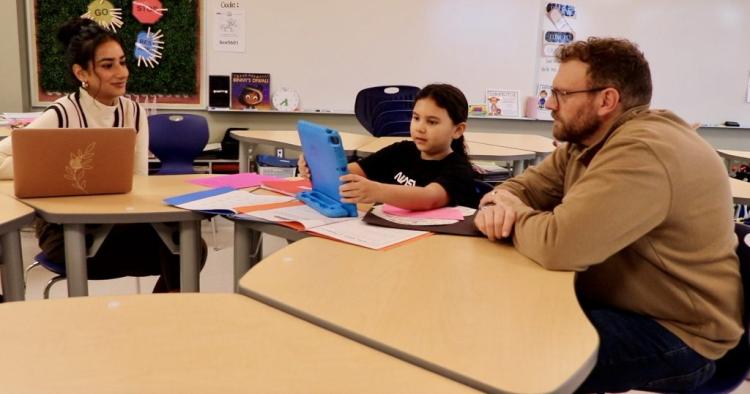
From colourful art pieces, to written stories, and even video game projects, elementary students across the District have been busy selecting work that they are most proud to showcase to their families.
The carefully curated work is all part of student inclusive conferences, which are in-person learning updates aimed to communicate student learning to parents/guardians.
Student inclusive conferences are approximately half an hour meetings involving the student, teacher, support staff, and parent/guardian to discuss student progress in a positive environment.
"They are all there for one reason and that is to celebrate and collaborate with the student," said Jennifer Espin, Vice-Principal of Richard Bulpitt Elementary.
"The conferences are celebrations of the student's learning, and their learning journey, where they are now,' and also, where they're going to go in the future. Goal setting is a huge part of the conference, and it is all about collaboration as well," she explained.
As part of the conference, she says students are asked to lead the conversation, and to share what they've learned, but also share what they've learned about themselves as a learner. Self-assessments from the students on rubrics such as communication, thinking, personal, and social skills (core competencies) are shared. Families are also encouraged to share their reflections. Together as a team they work together to develop goals with the student.
Espin said it "lends to understanding the whole child."
"It's a shift away from where report cards were sent home, parents were reading, and the focus was on the grades. I think parents have such a deeper understanding of where their child is as a learner after they've sat through one of these conferences," commented Espin.
Jennifer Cameron, a longtime teacher at Langley Fine Arts, believes the top benefit of these conferences is "the child having a voice."
"When I was a child, I didn't have a formal voice in my learning journey. Report cards were very much an adult undertaking. Having students and families celebrate, collaborate, and set goals together, gives students such ownership over their goals," commented Cameron.
"It's not teacher directed, it's students, as young as Kindergarten, being part of deciding what to celebrate and what to work on, and that is so powerful," she added.
Sarah Michel, a Langley Fine Arts parent, whose son is a student in Cameron's class, likes the connection, collaboration, and ability to have everyone involved in these conferences.
"I think having each voice is helpful, helps him to understand his learning, and helps him to understand that we can all have goals, and we can all work towards things, and it's nice for us to be included in what some of our goals are for him," said Michel.
At Richard Bulpitt, Espin reflects on the evolution of student inclusive learning conferences. Espin has been involved with them since the start when the District first piloted them in the winter of 2020 at R.C. Garnett Demonstration School.
Back then when she was a teacher, she said a lot of feedback was provided to the District to help make improvements over the years. Now as an administrator, she has seen the process grow.
"Little tweaks here and there, have been made to make it more meaningful and more straight forward for staff and students, and I think that's where we are now doing student inclusive conferences across the District," she added.
To learn more about student inclusive conferences in elementary schools, visit the District's communicating student learning webpage here.










